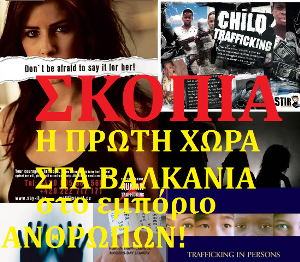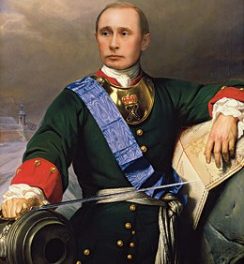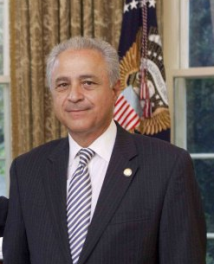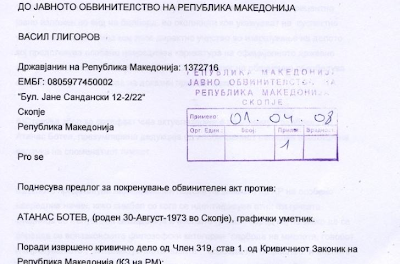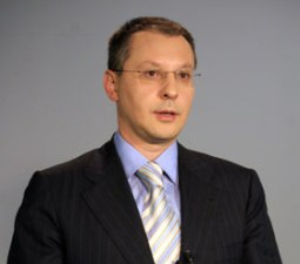Τα Σκόπια συγκαταλέγονται ανάμεσα στις πρώτες, και η μόνη μαζί με την Κροατία Βαλκανικές χώρες-ΣΤΗ ΖΩΝΗ 1-, οι οποίες λειτουργούν όχι μόνο ως αφετηρία, ενδιάμεσος σταθμός αλλά και προορισμός για γυναίκες και παιδιά που έχουν πέσει θύματα εμπορίου λευκής σαρκός με σκοπό την σεξουαλική εκμετάλλευση, σύμφωνα με την ετήσια έκθεση του State Department που ανακοινώθηκε χθες. «Η κυβέρνηση της ""Μακεδονίας"" εκπληρώνει τα μικρότερα standards για την μείωση του εμπορίου ανθρώπινης σαρκός." Η κυβέρνηση των Σκοπίων σημειώνει η έκθεση με έμφαση "δεν δίωξε ποινικώς καμία ενέργεια που παραπέμπει σε τέτοιου είδους καταστάσεις". Ωστόσο, οι ίδιες αναφορές των αμερικανών στην ίδια έκθεση λένε ότι η διαφθορά συνεχίζει να παρακωλύει της προσπάθειες για την αντιμετώπιση του φαινομένου.
Σύμφωνα με την έκθεση, τα θύματα εμπορίου στο κρατίδιο των Σκοπίων είναι κυρίως από την Αλβανία και το Κόσοβο, ενώ αυτά που είτε έχουν καταγωγή από τα Σκόπια, είτε η χώρα αποτελεί ενδιάμεσο σταθμό έχουν προορισμό την Νότια Κεντρική και Δυτική Ευρώπη. Ο τρόπος που λειτουργούν οι έμποροι, όπως αναφέρει η έκθεση, είναι κυρίως μέσω του ιδιωτικού τομέα, με ινστιτούτα ομορφιάς και άλλες παρεμφερείς "επιχειρήσεις". Η έκθεση καταγράφει την πρόοδο που που έχει συντελεστεί από τις κυβερνήσεις των 175 χωρών να καταπολεμήσουν το εμπόριο λευκής σαρκός, στοχεύοντας στην παγκόσμια αφύπνηση, αλλά και παρακινώντας τις κυβερνήσεις να παρούν πιο αποτελεσματικά μέτρα για την αντιμετώπιση του φαινομένου.
ΣΕ ΕΛΛΗΝΑ ΑΞΙΩΜΑΤΙΚΟ ΤΗΣ ΕΛΛΑΣ ΑΠΟΔΙΔΕΙ ΕΥΣΗΜΑ Η ΕΚΘΕΣΗ ΤΩΝ ΑΜΕΡΙΚΑΝΩΝ ΓΙΑ ΤΗΝ ΚΑΤΑΠΟΛΕΜΗΣΗ ΤΟΥ ΕΜΠΟΡΙΟΥ ΑΝΘΡΩΠΩΝ
από τον Μιχάλη Ιγνατίου/ΕΘΝΟΣ
«Ηρωας» αξιωματικός της ΕΛ.ΑΣ. Ενας αξιωματικός της Ελληνικής Αστυνομίας περιλαμβάνεται στον κατάλογο των εννέα «Ηρώων της Παγκόσμιας Προσπάθειας για την Καταπολέμηση της Παράνομης Εμπορίας Ανθρώπων», που ανακοίνωσε χθες στο Στέιτ Ντιπάρτμεντ η υπουργός Εξωτερικών, Χίλαρι Κλίντον.Πρόκειται για τον Αστυνόμο Α Γεώργιο Βανικιώτη, ο οποίος ασχολείται με μεγάλη επιτυχία με την καταπολέμηση του οργανωμένου εγκλήματος και της εμπορίας ανθρώπων. Ο Ελληνας αξιωματικός και οι συνεργάτες του κατάφεραν να εξαρθρώσουν μεγάλα κυκλώματα εμπορίας γυναικών και παιδιών στην Ελλάδα και να οδηγήσουν στη Δικαιοσύνη τους υπευθύνους.
Η κ. Κλίντον παρουσίασε σε ειδική τελετή την ετήσια έκθεση για την παράνομη εμπορία προσώπων για το 2009, στην οποία η Ελλάδα και η Κύπρος κατατάσσονται στη «2η κατηγορία», έχοντας καταβάλει μεγάλες προσπάθειες για να αντιμετωπίσουν το απαράδεκτο «φαινόμενο».
Η έκθεση
Σύμφωνα με την έκθεση, η χώρα μας δεν ανταποκρίνεται πλήρως και δεν λαμβάνει μέτρα που θα μπορούσαν να οδηγήσουν σε εξάλειψη της διακίνησης ανθρώπων. Ομως τονίζεται πως η Ελληνική Αστυνομία έχει καταβάλει σημαντικές προσπάθειες για να πατάξει τους εμπόρους συνανθρώπων μας, αυξάνοντας τη συνολική χρηματοδότηση για την προστασία των θυμάτων. Παράλληλα, οι ειδικές αστυνομικές υπηρεσίες υπό τον κ. Βανικιώτη έχουν καταβάλει σθεναρές προσπάθειες κατά της διακίνησης, όπως σημειώνεται χαρακτηριστικά.
Η Ελλάδα, προστίθεται, είναι χώρα προορισμού και διέλευσης για γυναίκες και παιδιά που διακινούνται για σκοπούς σεξουαλικής εκμετάλλευσης, και ανδρών και παιδιών που διακινούνται με σκοπό την καταναγκαστική εργασία.
Οι συγγραφείς της έκθεσης σημειώνουν ότι στην Ελλάδα οι γυναίκες διακινούνται από την Ανατολική Ευρώπη, τα Βαλκάνια και την Αφρική, με σκοπό την εμπορική σεξουαλική εκμετάλλευση και την αναγκαστική εργασία. Αναφέρονται ως «χώρες-πηγές» η Αλβανία, η Ρουμανία, η Βουλγαρία, η Νιγηρία και η Βραζιλία. Επίσης διακινούνται προς τη χώρα μας για αναγκαστική εργασία πολίτες του Πακιστάν, του Αφγανιστάν, της Ινδίας και του Μπανγκλαντές.
Η ΣΥΝΕΝΤΕΥΞΗ ΤΥΠΟΥ ΤΗΣ HILLARY CLINTON
and Western Europe. Children, primarily ethnic Roma, are trafficked for the purpose of forced begging within the country. Victims were trafficked for the purpose of forced labor in Macedonia's service sectors. Traffickers' modus operandi continued to evolve in response to law enforcement tactics, including increased use of more hidden, private sectors, such as beauty salons and massage parlors.
trafficking. While the government could strengthen its performance in certain areas, the government improved implementation of the anti-trafficking statute to obtain convictions of trafficking offenders and continued to expand the usage of its victim-centered standard
operating procedures for the treatment and protection of trafficking victims.
prosecuting suspected traffickers under the antitrafficking statute was reported during the year. The government prohibits sex and labor trafficking through its 2004 criminal code; Article 418(a) and (g) covers all forms of trafficking in persons. The minimum penalty prescribed for trafficking for commercial sexual exploitation is four years' imprisonment, which is sufficiently stringent and commensurate with penalties prescribed for other grave crimes, such as rape. In 2008, the government prosecuted 11 cases under article 418(a) and (g) involving 28 trafficking suspects, resulting in the conviction of 17 trafficking offenders. The average sentence imposed was five years' imprisonment.
however, reports indicated that corruption continued to directly hamper Macedonia's anti-trafficking efforts.
For example, local brothel owners were occasionally tipped off prior to raids, allowing traffickers to elude law enforcement and brothel owners to hide potential trafficking victims.
Protection
The Government of Macedonia demonstrated some progress in its protection of trafficking victims in 2008.
It continued to conduct training, with the support of international donors, on its standard operating procedures (SOPs) on the identification and referral of trafficking victims, and implementation of these procedures has continued to improve; however,application of the SOPs by local police was at times ad hoc and dependent on particular, victim-sensitive officers.
The government has acknowledged that local police need more consistent understanding and application of the SOPs, and in January 2009 implemented a new requirement that all raids conducted by local police must include an officer from the police anti-trafficking unit.
MADAGASCAR government continues to operate a reception center for foreign migrants and trafficking victims; victims' freedom of movement in this center is severely restricted. Although law enforcement reported it identified 130 "presumed" victims in 2008, only 18 victims, 14 of whom were Macedonian, qualified as trafficking victims during the reporting period. The government encouraged victims to participate in investigations and trials. The government in January 2008 created provisions for the offering of a six-month residency permit and reflection period to foreign victims; none of the 118 presumed foreign victims identified during the reporting period requested this permit. Presumed domestic victims were entitled to a 30-day reflection period in the domestic shelter before taking part in a formal interview process with a trained trafficking specialist. The government provided some reintegration support through its 27 Centers for Social Welfare. These centers assisted seven victims in 2008.
NGOs and international experts reported some problems with the government's identification process, resulting in possible misidentification of potential trafficking victims by local authorities.
Prevention
The government collaborated with NGOs and the international community in its trafficking prevention efforts, and in December 2008 drafted a National Action Plan for the years 2009-2012. It did not provide any direct financial support for NGOs conducting anti-trafficking
prevention activities during the reporting period, but continued to provide significant in-kind support. In May 2008, the government conducted a nationwide survey to determine the public's level of awareness about trafficking. Based on the findings, it conductednine public roundtables throughout the country. The government included mandatory training in its primary and secondary school curriculum to prevent trafficking.
Greece is a destination and transit country for women and children trafficked for the purpose of sexual exploitation and for men and children trafficked for the purpose for forced labor. Women and teenage girls were trafficked from Bulgaria, Romania, Albania, other parts of Eastern Europe and the Balkans, Nigeria, and Brazil into forced prostitution and forced labor. One NGO reported that there were many teenage male sex trafficking victims from Afghanistan and sub-Saharan Africa in Greece.
Victims of trafficking for labor exploitation originated primarily from Albania, Romania, Moldova, Afghanistan, Pakistan, India, and Bangladesh and most were forced to work in the agriculture or construction sectors. Child labor trafficking victims were subjected to forced begging and forced to engage in petty crimes. Some victims are found among the approximately 1,000 unaccompanied minors who enter Greece yearly. Several NGOs reported
anecdotal evidence that Roma women and children were trafficked within Greece. There was also anecdotal evidence of trafficking in the domestic service sector.
enforcement data to include information on sentences served; continue victim identification and assistance training for officials most likely to encounter labor and sex trafficking victims; encourage the sustainability of funding for anti-trafficking NGOs; ensure specialized protection for potential child victims; ensure potential victims are offered options for care and immigration
relief available under Greek law; and strengthen public awareness campaigns targeted to a Greek audience, including potential clients of the sex trade and beneficiaries of forced labor.
Prosecution Greece's specialized anti-trafficking police officers demonstrated strong law enforcement efforts, but concerns over inadequate punishment of trafficking offenders, including officials complicit in trafficking, remained. Greek law 3064, adopted in 2002, prohibits
trafficking for both sexual exploitation and forced labor,and prescribes imprisonment of up to 10 years and a fine of $14,000 to $70,000. These penalties are sufficiently stringent and commensurate with those prescribed for other grave crimes. Many trafficking-related statistics, such as the total number of trafficking prosecutions and suspended sentences of convicted trafficking offenders, were unavailable. According to available data, law enforcement arrests of suspected trafficking offenders increased from 121 in 2007 to 162 in 2008.
Police conducted 37 sex trafficking investigations, two labor trafficking investigations and one investigation of trafficking for the removal of human organs. The government reported 21 convictions of trafficking offenders, 17 acquittals, and 41 ongoing prosecutions during 2008. Sentences for the 21 convicted offenders ranged from one year to almost 17 years' imprisonment, and many sentences also included fines, though many convicted trafficking offenders continued to be released pending lengthy appeals processes. Greek courts, especially at the appeals level, often give convicted trafficking offenders suspended sentences. Several former government officials, including an ex-mayor charged with trafficking complicity in 2005, were given suspended sentences during the year. Three police officers allegedly involved in the rape of a victim while she was in police custody in 2006 remained on bail while awaiting prosecution on charges of breach of duty, abuse of authority, repeated rape, and complicity in rape. During the last year, the Ministry of Foreign Affairs completed investigations of several officials suspected of involvement in a trafficking network but found no evidence of trafficking complicity.
procedures were used by border police, the coast guard, and the vice squad. Greece's specialized antitrafficking police exhibited adequate victim identification procedures, though NGOs noted that trafficking victims were far more likely to be first encountered by personnel
of other Greek law enforcement agencies that did not have the same skill in identifying victims. Anti-trafficking police made efforts to address this problem through training and dissemination of awareness materials for border and vice squad authorities. Officials identified 78
trafficking victims in 2008, compared to 100 identified in 2007. NGOs and international organizations reported assisting at least 657 victims in 2008. NGOs reported excellent cooperation with the specialized anti-trafficking police unit and lauded a memorandum of cooperation between the government and NGOs, but potential victims remained vulnerable to arrest for unlawful acts committed as a direct result of being trafficked. The Greek government in 2008 ratified a child repatriation agreement with Albania that had been drafted in 2004, but implementation has been slow. The government has few special protections in place for child victims of trafficking; when identified, they were often sheltered in orphanages or detention centers that did not have specialized facilities for trafficking victims.
Prevention
The government conducted general anti-trafficking awareness campaigns during the reporting period but insufficiently targeted potential clients of the sex trade or beneficiaries of forced labor in Greece. The Ministry of Foreign Affairs (MFA) funded several prevention initiatives, including a hotline for potential victims and an extensive joint campaign with UNICEF focused on global child trafficking. The government also funded the production of public awareness posters and information cards printed in multiple languages alerting potential victims to government resources. In 2008, the MFA created a new working-level task force on combating
trafficking to complement the high-level Inter-ministerial Task Force on Human Trafficking. The government funded training and seminars on trafficking awareness for various government officials. Greek law has extraterritorial coverage for child sex tourism. The Greek government
gave its peacekeeping troops explicit anti-trafficking training before deploying them abroad. Greece has not ratified the 2000 UN TIP Protocol.

